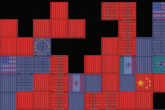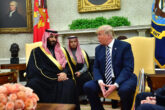January 14, 2020
Trump Has Made Sanctions a Path to Strikes
Economic measures can de-escalate tensions, but not if used crudely.
U.S. President Donald Trump’s decision to kill the Iranian general Qassem Suleimani, the architect of Iran’s political and military influence in the Middle East, and the Iranian response represent grave escalations in hostilities between the United States and Iran. While both sides have signaled a desire to pull back since these strikes, the world should not exhale too deeply. Trump has offered fresh threats of “punishing economic sanctions” on Iran, which he followed through with on Friday, imposing sanctions on more Iranian officials who had a direct role in the missile attacks, as well as more important economic sectors such as steel, aluminum, copper, and iron.
The continued use of U.S. sanctions, in the absence of negotiations and with a heightened military posture, means that the United States and Iran are locked into a confrontational stance with no plans for de-escalation.
In his speech on Jan. 8 addressing Iran’s attack on U.S. targets in Iraq, Trump said he wanted a new deal to replace the Iran nuclear accord. He refrained from announcing fresh strikes on Iranian targets. Many relieved observers have praised the move as a critical pause in hostilities.
Read the full article in Foreign Policy.
More from CNAS
-
Transatlantic Security / Middle East Security / Energy, Economics & Security
Sanctions Aren’t Enough to Shut Down the Moscow-Tehran Black Market for WarThe geographic scope and extent of Iranian-Russian cooperation highlights the failure of traditional sanctions to prevent Moscow and Tehran from seeking key components like ch...
By Delaney Soliday
-
Game Over?
The trade wargame suggests that sustained high tariffs could create leverage and urgency to spur action toward a productive restructuring of the international trade system....
By Emily Kilcrease & Geoffrey Gertz
-
Middle East Security / Energy, Economics & Security
Trump Inks $600 Bn Deal In Saudi Arabia | Musk, Blackrock CEO Flank Trump In Gulf VisitIn today's episode of India Global, U.S. President Donald Trump secured a $600 billion commitment from Saudi Arabia on Tuesday to invest in the United States. NDTV's Gaurie Dw...
By Daniel Silverberg
-
Energy, Economics & Security / Technology & National Security
Tariffs and Tech: An Uncertain RecipeHigher tariffs could prompt American cloud companies to shift more of their capital investments abroad....
By Pablo Chavez




